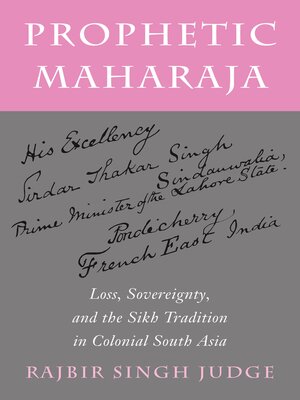Prophetic Maharaja
ebook ∣ Loss, Sovereignty, and the Sikh Tradition in Colonial South Asia · Religion, Culture, and Public Life
By Rajbir Singh Judge

Sign up to save your library
With an OverDrive account, you can save your favorite libraries for at-a-glance information about availability. Find out more about OverDrive accounts.
Find this title in Libby, the library reading app by OverDrive.



Search for a digital library with this title
Title found at these libraries:
| Library Name | Distance |
|---|---|
| Loading... |
How do traditions and peoples grapple with loss, particularly when it is of such magnitude that it defies the possibility of recovery or restoration? Rajbir Singh Judge offers new ways to understand loss and the limits of history by considering Maharaja Duleep Singh and his struggle during the 1880s to reestablish Sikh rule, the lost Khalsa Raj, in Punjab.
Sikh sovereignty in what is today northern India and northeastern Pakistan came to an end in the middle of the nineteenth century, when the British annexed the Sikh kingdom and, eventually, exiled its child maharaja, Duleep Singh, to England. In the 1880s, Singh embarked on an abortive attempt to restore the lost Sikh kingdom. Judge explores not only Singh's efforts but also the Sikh people's responses—the dreams, fantasies, and hopes that became attached to the Khalsa Raj. He shows how a community engaged military, political, and psychological loss through theological debate, literary production, bodily discipline, and ethical practice in order to contest colonial politics. This book argues that Sikhs in the final decades of the nineteenth century were not simply looking to recuperate the past but to remake it—and to dwell within loss instead of transcending it—and in so doing opened new possibilities.
Bringing together Sikh tradition, psychoanalysis, and postcolonial thought, Prophetic Maharaja provides bracing insights into concepts of sovereignty and the writing of history.







